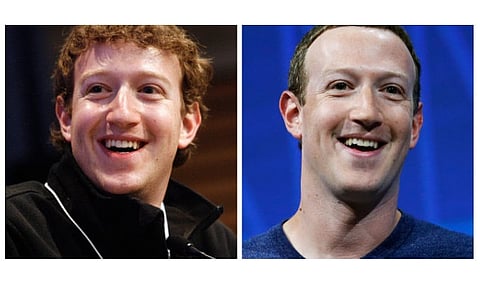Does Facebook use your #10YearChallenge photos for data?
Do your #10YearChallenge photos help train Facebook’s facial recognition algorithms?

Dubai: How sure are you that your #10YearChallenge Facebook pictures are not being used for facial recognition software?
Apparently, this is a worry for many social media users. But, Facebook refutes it and posted the following statement on Twitter: “The 10-year challenge is a user-generated meme that started on its own, without our involvement. It’s evidence of the fun people have on Facebook, and that’s it.”
The response from Facebook came after a tweet-theory by US-based tech author Kate O’Neill about the challenge went viral on social media.
O’Neill posted on her Twitter page on January 12: “Me [from] 10 years ago: probably would have played along with the profile picture aging meme going around on Facebook and Instagram.
“Me now: ponders how all this data could be mined to train facial recognition algorithms on age progression and age recognition.”
But there were several disagreements. The most common as tweep @corecorina wrote, was: “...to be fair. Facebook already had most of these photos already. [And they were] mostly timestamped....”
@arhythmutopiaeople added: “People are just paranoid. Most of us use profile pictures for the challenge and profile pictures are never private, and never were. The data you feel you just gave away, they already had....”
Captions add context
O’Neill then posted a thread of tweets addressing arguments and filling out the details of her theory.
In one post, she outlined why the available data on Facebook was not necessarily usable, and how the #10YearChallenge format could make it easy to use: “People could have scanned offline photos. People might have uploaded pictures multiple times over years. Some platforms strip ... data for privacy; people’s captions are helpfully adding that context back, as well as other context about where and how the pic was taken.”
Implications for users
Many social media users appreciated her theory — while others were troubled by the implications.
@jeezoh tweeted: “A very thought-provoking post. Thank you. We tend to sometimes think of our ‘data’ as written information and facts, but this now extends to faces, behaviours, etc. And the hashtags make all the photos so easy to find online.”
Tweep @eserviss posted: “Interesting... I wonder if data gathering methods are sophisticated enough to look at the uploaded picture, the image file metadata, and the user generated content and combine. Scary thought!”
@JeffDStephens agreed: “The effects of ageing are well known in the face biometrics industry. [ O’Neill brings up] a very valid use case to train the algorithm to better handle the face variations introduced over the years. Precisely why many biometric systems want re-enrollment cycles.”
Sign up for the Daily Briefing
Get the latest news and updates straight to your inbox



